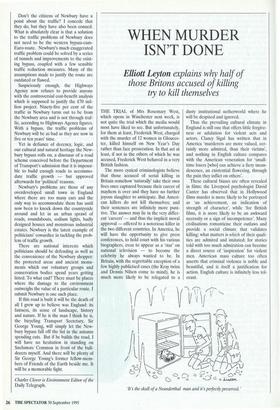WHEN MURDER ISN'T DONE
Elliott Leyton explains why half of
those Britons accused of killing try to kill themselves
THE TRIAL of Mrs Rosemary West, which opens in Winchester next week, is not quite the trial which the media would most have liked to see. But unfortunately, for them at least, Frederick West, charged with the murder of 12 women in Glouces- ter, killed himself on New Year's Day rather than face prosecution. In that act at least, if not in the others of which he was accused, Frederick West behaved in a very British fashion.
The more cynical criminologists believe that those accused of serial killing in Britain somehow 'naturally' take their own lives once captured because their career of mayhem is over and they have no further joyous slaughter to anticipate. But Ameri- can killers do not kill themselves; and their sentences are infinitely more puni- tive. The answer may lie in the very differ- ent 'careers' — and thus the implicit moral approval — offered to a notorious killer in the two different countries. In America, he will have the opportunity to give press conferences, to hold court with his various biographers, even to appear as a 'star' on national television — to become the celebrity he always wanted to be. In Britain, with the regrettable exception of a few highly publicised cases (the Kray twins and Dennis Nilsen come to mind), he is much more likely to be relegated to a
dusty institutional netherworld where he will be despised and ignored.
Thus the prevailing cultural climate in England is still one that offers little forgive- ness or adulation for violent acts and actors. Clancy Sigal has written that in America 'murderers are more valued, cer- tainly more admired, than their victims', and nothing in English culture compares with the American veneration for 'small- time losers [who] can achieve a fiery incan- descence, an existential flowering, through the pain they inflict on others'.
These cultural biases are often revealed in films: the Liverpool psychologist David Canter has observed that in Hollywood films murder is more likely to be portrayed as 'an achievement, an indication of strength of character', while 'for British films, it is more likely to be an awkward necessity or a sign of incompetence'. Many civilisations romanticise their outlaws and provide a social climate that validates killing; what matters is which of their quali- ties are admired and imitated; for stories told with too much admiration can become a direct source of 'inspiration' for violent men. American mass culture too often asserts that criminal violence is noble and beautiful, and is itself a justification for action. English culture is infinitely less tol- erant.
`It's the skull of a Neanderthal man and it's perfectly preserved.' Killers are no different from anyone else in one respect at least — they internalise society's view of them. If the civilisation loathes who they are and what they have done, the killer must struggle with that conundrum. Thus English murderers are more likely to be overwhelmed with shame for what they have done; and it seems impossible to contest the criminologist Wolfgang's suggestion that the suicide of killers is a clear reflection of a profound internal endorsement of social taboos.
But how can we be sure such inter- nalised mechanisms exist? What would be necessary to demonstrate that English civilisation has socialised proportionately more of its underclass members into an embarrassment about violence? One could deduce it from the low homicide rate; whatever you might imagine, England has the lowest homicide rate in the industri- alised world, lower than Sweden, Denmark and Switzerland, lower even than Japan. But there could be other factors at work.
A second test would be the prevalence of killers' expressions of remorse, but such expressions are often dubious and self- serving, parole-gaining tactics, perhaps learnt in jailhouse psychobabble sessions. Still, American killers seem more likely to speak of their act as if it were the central and justifiable success, not the fundamen- tal failure, in their lives.
The FBI Academy scholars Ressler, Burgess and Douglas, describe in their hook Rape and Sexual Assault one white serial murderer who found a 'legitimate' reason for each of his dozen killings: he claimed to have murdered one because his victim was prejudiced, a racist — 'I put my hand over her mouth and stick the gun to her head and tell her if she screams I'm going to blow her head off. She asks what I want and I tell her I want money and to rape her. She balked on that and said, "No white man fucking me no time." I'm think- ing she's one of those prejudices [sic] I have this terrible feeling I'm not being followed.' types.' This kind of publicly expressed rationalisation is relatively absent in English cases, where a lower shame threshold in the culture tolerates fewer excuses and makes a killing appear less forgivable.
Still, the ultimate 'proof' for the exis- tence of a lowered shame threshold can- not be loud protestations from the offender. It is when the killer, far from exulting in his triumph or simply profess- ing grief (feigned or genuine), proves he is experiencing deep remorse by committing suicide: in ending his own life, the killer shows he shares the culture's abhorrence of murder.
The reason for the extraordinarily low homicide rate in Britain, one per hun- dred thousand people, is intimately bound up with the fact that English killers are much more likely to take their own lives than murderers in other coun- tries. The figures for England and Wales show that half of killers attempted sui- cide (and 33 per cent of killers were suc- cessful) after the killing. This is in dramatic contrast with the only study on American killers, among whom only 4 per cent committed suicide (the figure rises to 10 per cent for Canada, and as high as 42 per cent for Denmark).
This is the closest we can hope to get to proof that, in contrast to their American counterparts, English killers experience a deep sense of shame; they have, to use the pyschologist's jargon, much more fully internalised society's abhorrence of their act. Nowhere is this phenomenon more concisely illustrated than in the suicide note from a 32-year-old South Yorkshire drifter, whose body was found hanging- from a tree in Cambridgeshire. He had previously served six years in prison in the 1980s for raping a 16-year-old, and then attacked and murdered a 22-year-old wait- ress at a holiday resort as she went for a walk. The note was addressed to the vic- tim's family: 'I can't do anything to help you through your grief. All I can do is kill myself. I hope it helps, even if it's just a bit.'
Such a troubled, violent, and impulsive drifter on the margin of English society can no more make amends for his act than any- one who kills — since murder is perhaps the only crime for which there can be no possible restitution — but his note and his self-destruction suggest that even such a person as that felt belated shame for his monstrous act.
American sexual serial killers, Dahmer, Bundy, Gacy, and DeSalvo had to be exe- cuted by someone else — fellow prisoners, or the state: their English equivalents tend to execute themselves, and probably will do so for the foreseeable future.
The author's Men of Blood: Murder in Modern England will be published on 19 October by Constable.



































































 Previous page
Previous page